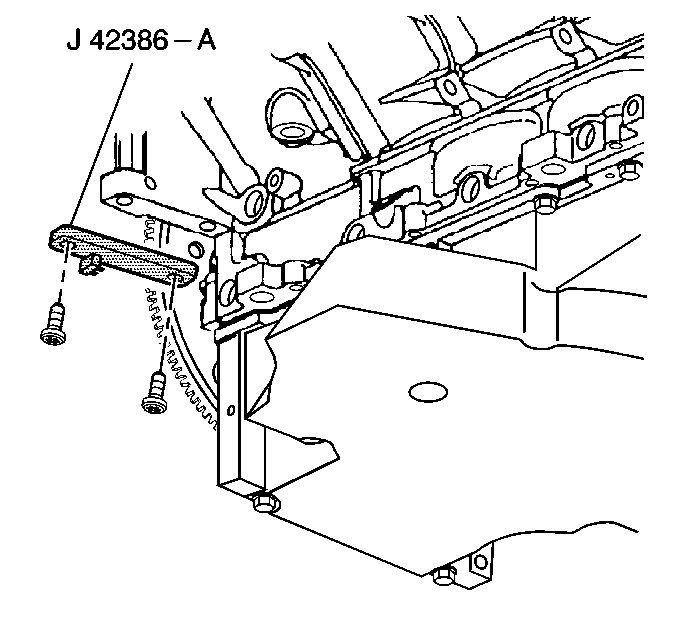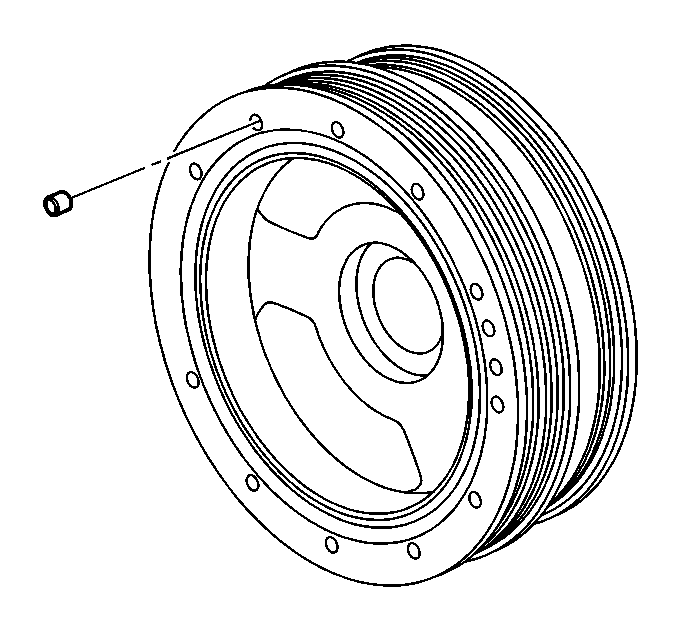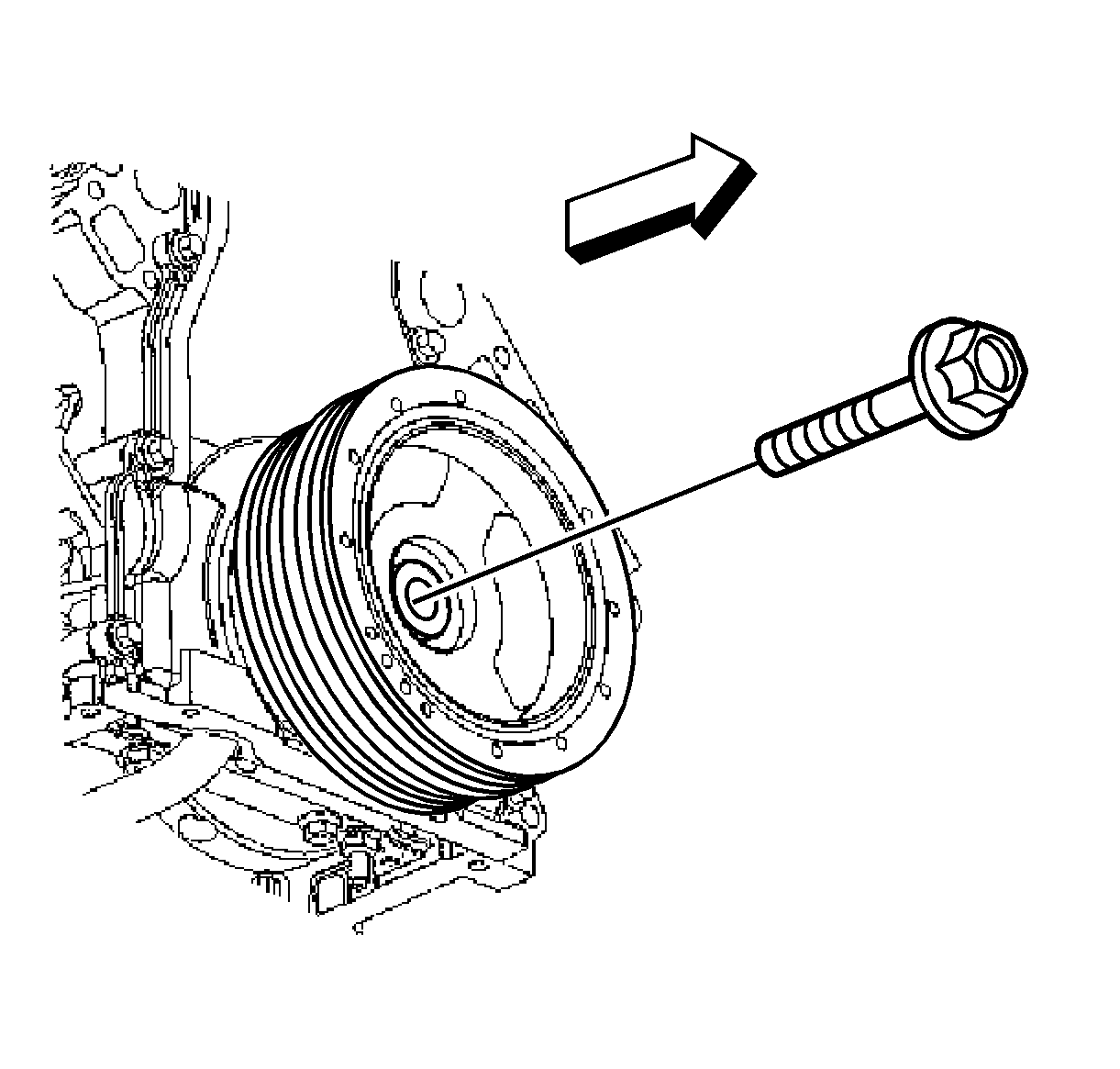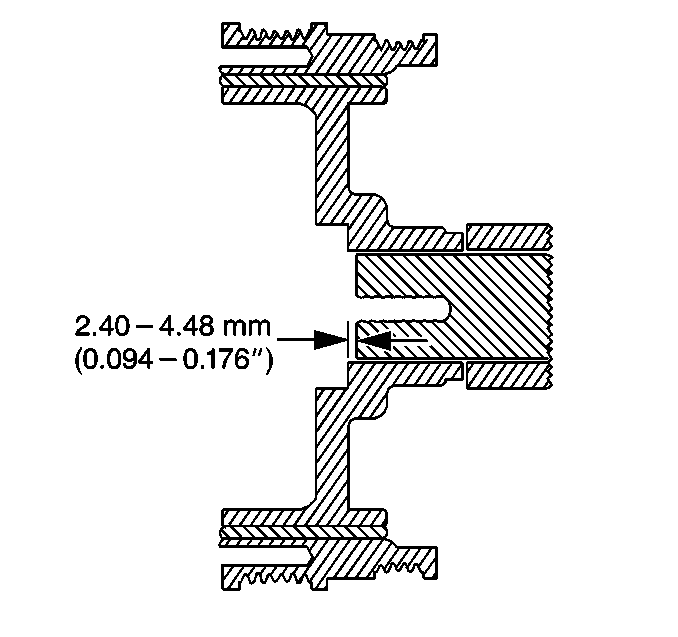Tools Required
| • | J 41665 Crankshaft Balancer and Sprocket Installer |
| • | J 36660-A Torque Angle Meter |
| • | J 42386-A Flywheel Holding Tool |
- Install the J 42386-A and bolts.
- Using the old balancer as a reference, mark or scribe the NEW balancer in the same location, if required.
- Install the balancer onto the end of the crankshaft.
- Use the J 41665 in order to install the balancer.
- Install the used crankshaft balancer bolt.
- Remove the used crankshaft balancer bolt.
- Measure for a correctly installed balancer.
- Install the NEW crankshaft balancer bolt.
- Tighten the crankshaft balancer bolt a first pass to 50 N·m (37 lb ft).
- Tighten the crankshaft balancer bolt a second pass to 140 degrees using the J 36660-A .
- Remove the J 42386-A .

Notice: Use the correct fastener in the correct location. Replacement fasteners must be the correct part number for that application. Fasteners requiring replacement or fasteners requiring the use of thread locking compound or sealant are identified in the service procedure. Do not use paints, lubricants, or corrosion inhibitors on fasteners or fastener joint surfaces unless specified. These coatings affect fastener torque and joint clamping force and may damage the fastener. Use the correct tightening sequence and specifications when installing fasteners in order to avoid damage to parts and systems.
Important:
• Note the position of the crankshaft balancer before removal, manual
transmission applications. The balancer does not use a key or keyway for
positioning. Mark or scribe the end of the crankshaft and the balancer
before removal. The crankshaft balancer must be installed to the original
position. If replacing the crankshaft balancer, note the location of any
existing balance weights, if applicable. Install new balance weights into
the new crankshaft balancer, if applicable. Crankshaft balancer weights
must be installed into the new balancer in the same location as the old
balancer. A properly installed balance weight will be either flush or
below flush with the face of the balancer. • The crankshaft balancer installation and bolt tightening involves a
four stage tightening process. The first pass ensures that the balancer
is installed completely onto the crankshaft. The second, third and fourth
passes tighten the new bolt to the proper torque. • The used crankshaft balancer bolt will be used only during the first
pass of the balancer installation procedure. Install a NEW crankshaft balancer
bolt and tighten as described in the second, third and fourth passes of
the balancer bolt tightening procedure. • Make sure the teeth of the tool engage the engine flywheel teeth.
Use one M10-1.5 x 120 mm and one M10-1.5 x 45 mm bolt for proper tool operation.
Tighten
Tighten the J 42386-A
bolts
to 50 N·m (37 lb ft).

Install balance weights into the NEW balancer, if required. Refer to Engine Balancing and Crankshaft Balancer Cleaning and Inspection .

Important: Align the scribe mark on the balancer with the scribe mark on the crankshaft.
The balancer should be positioned onto the end of the crankshaft as straight as possible prior to tool installation.
| 4.1. | Assemble the threaded rod, nut, washer and installer. |
Insert the smaller end of the installer into the front of the balancer.
| 4.2. | Use a wrench and hold the hex end of the threaded rod. |
| 4.3. | Use a second wrench and rotate the installation tool nut clockwise until the balancer is started onto crankshaft. |
| 4.4. | Remove the tool and reverse the installation tool. |
Position the larger end of the installer against the front of the balancer.
| 4.5. | Use a wrench and hold the hex end of the threaded rod. |
| 4.6. | Use a second wrench and rotate the installation tool nut clockwise until the balancer is installed onto the crankshaft. |
| 4.7. | Remove the balancer installation tool. |
Tighten
Tighten the crankshaft balancer bolt to 330 N·m (240 lb ft).

Important: The nose of the crankshaft should be recessed 2.40-4.48 mm (0.094-0.176 in) into the balancer bore.
If the balancer is not installed to the proper dimensions, install the J 41665 and repeat the installation procedure.

Tighten
